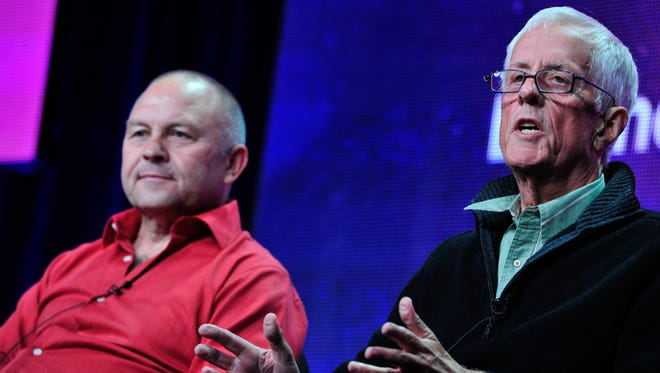'56 Up' is 'more optimistic' than director Apted expected

- Seven years have passed%2C so time to check in with the %27Seven Up%27 kids again
- Now they%27re middle-aged%2C with middle-aged woes and joys
- What will they say in another seven years%3F
Can it be possible that the Seven Up kids are now 56? Baby Boomers everywhere must be melancholic at this reminder of their (our) march toward mortality.
But 56 Up, the latest of the compelling documentaries examining a group of English children every seven years since 1964, is a hopeful hint that maybe the way ahead is not so dark. From the experience of these now-middle-aged Brits, it seems that Boomers have demonstrated they can cope.
Premiering Monday on PBS (10 p.m. ET/PT, check local listings), 56 Up is the eighth film in British director Michael Apted's unique documentary project, in which he filmed the participants talking about their lives, dreams, fears and futures at seven-year intervals.
And, yes, just to get it out of the way, he does plan to do a 63 Up, too. "I expect to, God willing," he says with a laugh during a phone interview from Los Angeles, where he has lived for three decades.
The films weave together footage of each of the 13 participants from the previous films, creating a sort of time-lapse picture of their life stories. The series has won worldwide acclaim (and earned Apted honorary degrees) for its affecting insights into the human condition and the influence of the British class system, still hanging around after all these years.
Apted says he wondered whether non-Brits could understand something so particular to Britain and realized only later, after coming to America, that viewers respond to the films' universal context.
"It's not so much about the class system, it's more about the characters, the individual dramas, because we all share in birth, marriage, jobs, failure, success, which is really what (the films are) about," he says.
So we hear about marriages and divorces, children, grandchildren and foster children, career successes, being homeless, being laid off, making the best of things. We hear about the one who moved to Australia (and gained a new accent) and the one who moved to America (and lost most of his). We learn about the one who achieved his dream and the one who didn't but still seems OK with it.
For Apted, an admired feature-film director (Coal Miner's Daughter, Gorky Park, Gorillas in the Mist) as well as a documentarian (Sting's Bring on the Night), the takeaway from 56 Up is reassuringly positive.

"I was worried it would be depressing, that it would be too concerned with mortality and the economic crisis we've been living through," he says. "I was surprised that it was much more optimistic and moving. People have invested a lot of time and energy in their families, so they had a stronger base to be in in these times."
The films, originally a project of Granada Television, were partly inspired by the Jesuits, the teacher priests of the Catholic Church, who used to proclaim, "Give us the child until he is 7, and we will give you the man." (Nowadays, they teach girls, too.)
Over five decades, the Seven Up series has explored this in a way no home movie, family photograph or academic treatise could ever convey.
Despite the huge changes in British culture, where Apted says money is now more distinctive than social class, it may be that the Jesuits were right: The participants in the new film seem not to have moved much from their original social classes, even though some of them dispute the notion that class is permanent rather than permeable.
"Each time I do (a new film), it seems like starting from the beginning and a blank slate," Apted says. "(The participants) are saying, 'This is who we are now.' "
Not all of the original (and adorable) children in Seven Up have participated in all the films; some have dropped out over the years, and even those who have returned have mixed feelings about Apted and their involvement.
"When we were doing 49 Up, the big elephant was reality TV, which had not existed before, and it was a big jolt to everybody," he says. "Reality TV was very trashy in the early days, and they wondered, 'Are we part of that?' "
One man returned in 56 Up because he wanted to promote his band; another wanted to promote his charity project in Bulgaria. Some complain that their real selves aren't truly depicted ("Is that all there is to me?" wonders Nick, who teaches electrical engineering). Others are shocked at the level of fame the series has brought them, at least briefly and at least in the United Kingdom.
London cabdriver Tony, a jolly sort despite having to give up his childhood dream of being a jockey, is vastly amused as he recounts how someone once asked for his autograph, even though astronaut Buzz Aldrin, the second man on the moon, was standing nearby.
At another point, electrical-engineering professor Nick is half exasperated, half amused as he tells Apted, "My ambition as a scientist is to someday be more famous as a scientist than for being in this film!"